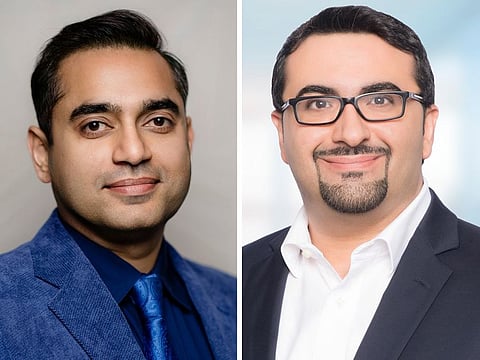Digital transformation of healthcare
Cerner’s senior physician executives share how HIT solutions are disrupting the industry

Cerner connects people and systems around the world by offering a range of intelligent solutions and tools that support the clinical, financial and operational needs of healthcare organisations. Dr Yasir Khan and Dr Mohamed Al Rayyes, Cerner’s Senior Physician Executives in Middle East and Africa, tell us how health information technology solutions are disrupting the industry.
What is digital health? How is it linked to modalities such as electronic health records, mobile health and digital transformation?
Dr Yasir Khan: With the prevalence of comprehensive health information technology solutions, these terminologies are being used interchangeably even though they are quite distinct.
Digital health is using technology to help improve individuals’ health and wellness. It’s a broad concept covering everything from wearable gadgets to robotic surgeons, from mobile health apps to artificial intelligence. It’s a vision of digitally transforming healthcare provision through implementation and democratisation of disruptive technologies.
Modern electronic health records (EHRs) such as Cerner Millennium are key enablers for digital health, without which an organisation’s digital healthcare transformation vision cannot be accomplished. In addition to providing the latest technology to create solutions that let communities and people engage in their own health, we work with our clients to create a service modernisation and quality improvement strategy.
Clinical information flow and its high availability provides the foundation for all other technologies to integrate, synchronise and function seamlessly. Contextual clinical decision support and advanced analytics are essential elements of modern comprehensive electronic medical records and are already proving vital for reimagining health and care.
What’s your take on the adoption of artificial intelligence innovations in the regional healthcare industry?
Dr Mohamed Al Rayyes: Various countries in the region such as Saudi Arabia and the UAE are positioning AI at the centre of their future visions and their policy development – that is surely a step in the right direction. However, a level of scepticism remains in the region around the robustness and accuracy of the tools and their output for healthcare. This scepticism will fade away, sooner or later, because the evidence is coming, and coming fast, from all around the world. We have a choice here in the region whether to wait for the evidence to grow more solid or contribute to its generation.
The Covid-19 pandemic made it easier for several healthcare and research organisations in the Middle East to choose the latter option. We are starting to see their innovative projects that use AI to answer important questions raised by the pandemic.
From machine learning models that can predict the probability of a Covid-19 patient requiring intensive care admission to models that stratify the population into priority groups for vaccination – even to models that try to predict the possible upcoming waves of the infection in certain cities or districts; the experiments are surfacing from many countries in the region. Nonetheless, we still find these projects to be done on small scales and struggling to be further validated on larger, more representative datasets. Hence, making the data sharing and accessibility issue even more crucial to resolving.
These and other AI projects and machine learning models must originate from the region and must be validated within. After all, we cannot borrow models that were developed in other regions and apply them in a plug-and-play fashion to our populations. It is through identifying, embracing, enabling and disseminating these small pockets of innovation that our healthcare industry can prosper in the Information Age 2.0. And it is the responsibility of everyone in the industry to take the initiative to support the new normal.
How do you foresee the future of healthcare information technology and what are the lessons learned from the Covid-19 pandemic?
Dr Khan: A few years from now, we will look back and see a clear distinction between the pre- and post-Covid eras when it comes to modernisation of healthcare delivery. From a healthcare information technology perspective, we are truly at a turning point where the industry is primed for disruption and Covid is proving to be the catalyst for change.
Healthcare providers around the world had to rely on health information technology to reach out to patients and provide services away from hospitals. They observed that by challenging the established norms, they were able to provide services efficiently and more conveniently.
New delivery models emerged that ranged from video appointments to home delivery of medications. Health information technology was able to support this shift towards community-based care while supporting integration of entire healthcare systems. There is renewed interest in virtual health, personalised care enabled by big data, interoperability and predictive analytics. These will hugely change the way care is delivered around the world.



